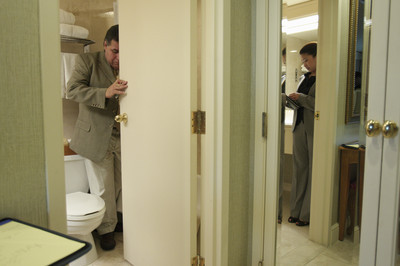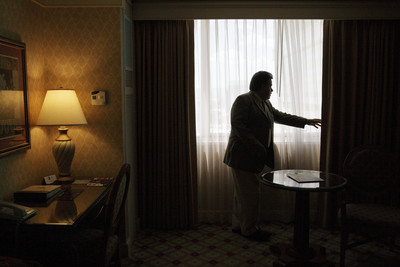Diamond Quest


When AAA Diamond ratings evaluator Vincent first enters a hotel room at The Mirage, he stops in the doorway and looks around, letting his senses take in the room.
What does he see? Or feel? Or smell? Are the lampshades crooked? Is the room temperature too extreme? Is there an odor?
As Vincent works, Mark Carlson, The Mirage’s executive director of hotel operations, stands quietly against a wall.
The AAA Diamond Ratings process received a pop-culture boost this summer as a plot line in the movie “Ocean’s Thirteen.”
In the movie, a casino mogul cuts one of the Oceans team out of an ownership share of a new casino, setting in motion a scheme to exact revenue by sabotaging the evaluation.
But this is no movie set. This is a real, unannounced evaluation.
After asking questions about room security, checking the dead bolt, looking through the peephole, Vincent (who asked that only his first name be used) moves into the bathroom.
He spends a few minutes checking cleanliness and bathroom amenities, running his finger along the top of the mirror for dust, and then moves into the guest room.
He compliments Carlson on the variety of glasses that accompany the minibar: wine glasses and regular drink glasses.
“It’s the little touches that different hotels have for our travelers that sometimes separate the property’s diamond ratings,” Vincent said before the inspection.
Vincent has been an evaluator for the association for 19 years, so he knows the industry cold.
After the wine glasses compliment, he moves through the rest of the room.
Is the television at a comfortable viewing position from the bed? What is the quality of the furnishings, from the armchairs to the ice bowl? How easy is it for a guest to hook up a personal computer and get online?
Vincent moves over to the desk and picks up a thick binder and starts to turn the pages.
“Man, that’s a nice guest service directory,” Vincent said. “Beautiful. Looks nice, feels good.
“It’s the little touches.”
He is soon checking the window coverings, running his fingers along the fabric, looking for inconsistencies, tears.
Vincent notices a missing knob on a dresser and a burned-out light in the bathroom, all normal wear and tear on an oft-occupied room in its 18th year of use.
Nothing to get excited about, or lose a diamond over, if the incidents are isolated.
Yen Vuong, The Mirage’s director of front office, jots notes.
The inspection of the room lasts seven minutes.
Vincent will check three more rooms, including two next to each other.
In the adjoining rooms, he opens the door between them and turns the television volume up to a slightly loud level.
He then moves into the adjoining room, closes the door and listens.
Nothing.
Nodding his head, Vincent is satisfied with the hotel’s soundproofing.
Before inspecting the rooms, he met with Carlson and Vuong to review the basic information for the guide: the number of hotel rooms, how many restaurants are at the property, and whether the rooms have safes, ironing boards and coffeemakers.
Vincent is one of 65 full-time inspectors employed by the travel service agency to evaluate 60,000 hotels and restaurants annually for its 45 million members.
AAA publishes 26 regional TourBook guides covering the United States, Canada, Mexico and Caribbean, printing 22 million copies combined.
The association published its first hotel directory in 1917, releasing its first TourBook in 1926.
AAA started using a rating system in 1963 under four categories: outstanding, excellent, very good and good.
The association started using the diamond system in 1977 for hotels and 1989 for restaurants.
Vincent splits his time between hotels and restaurants. Some of his hotel evaluations require an overnight stay, but The Mirage was a daytime evaluation.
A second evaluator will stay overnight during the next few months to gauge other areas, such as room service.
Vincent said he usually meets with a regional representative to receive his assignments after he reaches his destination.
He did not know he was evaluating The Mirage until the night before.
Vincent said the evaluations carry a lot of weight in the service industry. Although it’s rare, some managers have been moved, demoted or fired after their hotels received bad reviews, he said.
Claes Landberg, Green Valley Ranch Resort’s vice president of hotel operations, said most hotel operators welcome the visits as a measuring stick of how the property compares.
“When you’re comfortable with your product and you have established what the experience for the guest is going to be, it can be a great experience,” Landberg said. “You rarely have the opportunity to have someone come and completely scrutinize your operation and your service delivery.”
Unwilling to name competitors by name, Vincent said the association is the only company sending inspectors to all the properties it rates.
With the growth of the Internet over that past decade has come an increase in the number of travel Web sites.
The travel sites book hotel rooms and then grade, usually rating them with one to five stars.
“Stars are meaningless, I really believe that,” Vincent said. “Stars are meaningless because you don’t know what the basis is.”
AAA publishes its criteria on its Web site and is public about its process.
“It fills that immediate trust with the traveling guest that if AAA says something, it is pretty true,” said Bob Finch, general manager of the four-diamond rated Green Valley Ranch Resort.
Just 93 of the nearly 32,000 rated hotels received the Five Diamond Award rating in 2007.
Las Vegas had five: The Ritz-Carlton at Lake Las Vegas, Bellagio, Wynn Las Vegas, Four Seasons and Skylofts at the MGM Grand.
Another 1,102 hotels received the “Four Diamond Award” rating including 19 in Nevada.
On the Strip alone, MGM Grand, Monte Carlo, Caesars Palace, Mandalay Bay, Paris Las Vegas, The Hotel at Mandalay Bay, The Venetian, Treasure Island and The Mirage all received four diamonds.
Vincent said there is a wall between the investigators and advertising. He said he does not know which hotels advertise in the guidebooks or on the Web site. He doesn’t even know what an ad costs.
Hotels have pulled advertising or their listings from the books because of a rating or comment given by the evaluator.
“Members pay for us to go out and get information and it’s expensive,” Vincent said. “While they want the ratings they want a whole lot more.”
Vincent said members want the proprietary information that comes from the full-time staff in the field critiquing hotels and restaurants.
After the inspections at The Mirage are complete, Vincent has a private meeting to go over his observations.
At the end of the day, The Mirage retained its four-diamond rating for the 2008 guidebooks.












